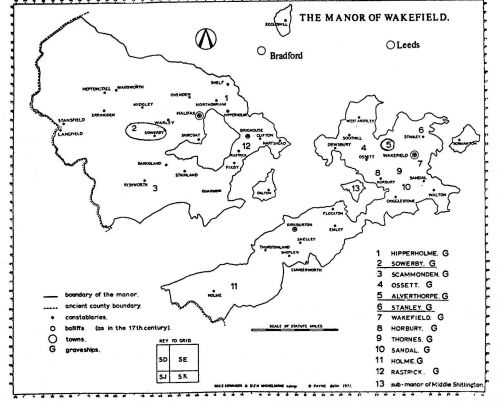1316 - Ralph the Collier in Manor of Wakefield: Difference between revisions
From International Robin Hood Bibliography
m (Text replacement - "=== IRHB comments ===" to "== IRHB comments ==") |
m (Text replacement - "=== Source notes ===" to "== Source notes ==") |
||
| Line 15: | Line 15: | ||
{{quote|[...] Ralph the Colier [...] 2<i>d</i>. [...] for the same [''i.e.'' not coming to court.]<ref>{{:Lister, John 1917a}}, p. 132.</ref>}} | {{quote|[...] Ralph the Colier [...] 2<i>d</i>. [...] for the same [''i.e.'' not coming to court.]<ref>{{:Lister, John 1917a}}, p. 132.</ref>}} | ||
</onlyinclude> | </onlyinclude> | ||
== Source notes == | |||
Lister (1917), p. 127: "Court held at Wakefield on Friday after the Octave of Easter" | Lister (1917), p. 127: "Court held at Wakefield on Friday after the Octave of Easter" | ||
== IRHB comments == | == IRHB comments == | ||
Revision as of 14:13, 18 October 2018
| Record | |
|---|---|
| Date | 1316 |
| Topic | Ralph the Collier among a large number of people fined for not coming to court. |
Wakefield, the chief town of the Manor of Wakefield.

The Manor of Wakefield, from Briginshaw Family. Click to enlarge.
By Henrik Thiil Nielsen, 2015-09-05. Revised by Henrik Thiil Nielsen, 2018-10-18.
Record
[...] Ralph the Colier [...] 2d. [...] for the same [i.e. not coming to court.][1]
Source notes
Lister (1917), p. 127: "Court held at Wakefield on Friday after the Octave of Easter"
IRHB comments
Collier was not an uncommon occupation, and Ralph was not an uncommon Christian name, so it is perhaps not surprising that at least one genuinely historical Ralph the Collier can be found. The tale of Rauf Coilȝear being a Scottish tale, there is of course no reason to believe that Ralph the Colier from the Wakefield manor court rolls gave his name to the tale or, conversely, that he was named after its hero. I do not believe this historical Ralph the Colier has been noted before.
Printed sources
Also see
Notes
